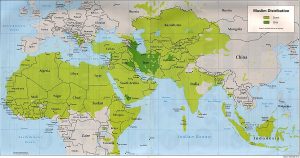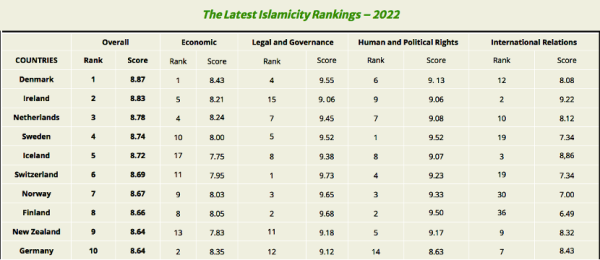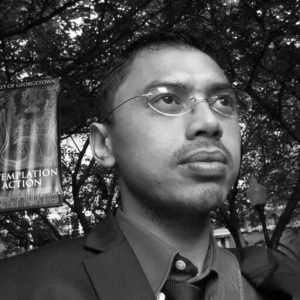Ehsan Shahwahid || 19 September 2023
A Muslim is the being where Islam dwells in; and perhaps quite less so in other matters Islamic, nor in any measures of Islamicity.
 Recently, a global index study has surfaced that appears to target Muslims. What can be seen in this index is not too uncommon with other global indices where many would be familiar with, in which countries or nation-states were ranked in a list, based on measure of scored points. What is also not dissimilar to the various world development indices, is that the top-ranked were mostly European nation-states from the global north, while filling the middle and bottom positions of the list, were countries usually categorized as developing and the so-called failed states. The poor performers also included many countries with high population of Muslims. The study is called the Islamicity Index (1).
Recently, a global index study has surfaced that appears to target Muslims. What can be seen in this index is not too uncommon with other global indices where many would be familiar with, in which countries or nation-states were ranked in a list, based on measure of scored points. What is also not dissimilar to the various world development indices, is that the top-ranked were mostly European nation-states from the global north, while filling the middle and bottom positions of the list, were countries usually categorized as developing and the so-called failed states. The poor performers also included many countries with high population of Muslims. The study is called the Islamicity Index (1).
The Islamicity Index sets its aim as to be the benchmark in building effective institutions for political, social, and economic reform and progress, indicating that is how the index perceive the state of being Islamic. The index was constructed based on several parameters of Islamicity. These parameters were economic, legal/governance, human/political rights, and international relations. These parameters might not seem unusual in the portrayal of development vision of the current nation-states. The performance of nations based on the parameters set were then assessed, measured, quantified, and eventually ranked into the table of nations.
One could assume the benchmark of Islamicity as to be represented by its top performers, countries usually seen as highly developed including Denmark, Sweden, Norway, Netherlands, and Germany. Though, these countries quite frequently in the past several years have been the target of criticism by Muslims globally as the cradle of anti-Muslims sentiments due to several Islamophobic incidents related to insults to the Qur’an, the Prophet, and other discriminatory acts towards Muslims.
The highest ranked Muslims countries (such as Malaysia, UAE and Qatar) only managed mid-table positions. Most other Muslim countries could not even make the top-100 positions, indicating they have failed to be Islamic. Perhaps more shockingly was Israel, not only in its inclusion in the list despite lacking recognition from most Muslims, but more profound was in its position of Islamicity at 45, higher than almost all Muslim countries.
What is rather strange is the fact that the index is named the index of Islamicity, despite the absence of the sense of Muslimness. Such strangeness could easily attract curiosity of a Muslim reader, and furthermore, a critical observation towards this indexing of Islam certainly raises several important questions.
How far is it possible for Islam/Muslimness to be objectively assessed and measured? It appears that the Islamicity Index is constructed based on a positive affirmation to the question. The approach taken in assessing the state of Islamicity indicates the influence of positivism towards Islam.
Positivism can be briefly described as a scientific approach to study the social world that assumes human society can be examined objectively as a state of nature. This approach has its roots in the natural sciences, and has been a force in the production of knowledge forming the dominant worldview of our current time. A positivist construction of Islam is problematic in a way that it tends to prescribe a set of value-based parameters that are assumed natural, operationalized through some form of mathematical modeling, complex computation and quantification; Islam simply ends up into a game of scores and numbers. Such an approach certainly neglects the more qualitative aspects and complex phenomena in regards to Islam. Thus, Islam, which for Muslims is a way of life solely under Divine guidance, becomes simply reduced to a state of scientificity.
 How far is it suitable for the state of being Islamic be presented in the form of developmental performance of nation-states? The indexing of Islamicity is developed based on certain measures for a state being Islamic. The parameters set for being Islamic are categorized in terms of; economic, legal/governance, human/political rights, and international relations conditions, and nation-states are ranked based on their performance of this modern developmental vision. It is worth considering that the genealogical roots of these developmental parameters are more grounded in European historical experiences and formulated from a Westernese discursive tradition. This vision of development, more often than not, uncritically claim the status of universality, and hence also constitutes the main social ideals of development for Muslim communities. Therefore, by adopting this vision, the index tends to normalise the euro-centric vision of a developed state.
How far is it suitable for the state of being Islamic be presented in the form of developmental performance of nation-states? The indexing of Islamicity is developed based on certain measures for a state being Islamic. The parameters set for being Islamic are categorized in terms of; economic, legal/governance, human/political rights, and international relations conditions, and nation-states are ranked based on their performance of this modern developmental vision. It is worth considering that the genealogical roots of these developmental parameters are more grounded in European historical experiences and formulated from a Westernese discursive tradition. This vision of development, more often than not, uncritically claim the status of universality, and hence also constitutes the main social ideals of development for Muslim communities. Therefore, by adopting this vision, the index tends to normalise the euro-centric vision of a developed state.
On top of that, the presentation of Islamicity as a list of states based on the category of nations in competition with one another, despite its common usage in the current ordering of the world, should also raise the question how far it is representative to the ordering of Islamic communities? Instead, such portrayal of Islamicity indicate the state of Islam being made trapped within the category of nation-states, while failing to encourage alternative imaginations for Muslims of how the Ummatic ordering of the world should be. Its framing of developmental parameters and nation-state ordering portrays traces of European and Westernese influences that to a certain extent making Islamicity closer to Euro-centricity, and less concerned with Muslimness.
This assessment of Islam that lacks the features of Muslimness; the dominance of scientific positivism in the measurement of matters Islamic; the presentation of Islam framed by features of Euro-centricity; these critical observations of the Islamicity index as briefly discussed above indicate another problematic feature – that it is more of an ontic examination, instead of being ontological. An ontic examination tends to see Islam reductively as an entity that can be simply described, empirically assessed, and attached fixed values upon, and such an approach only produces a limited, banal, and lifeless understanding. The common phrase that says “Islam is a way of life” indicate Islam as a holistic category with an infinite meaning-making capability in the life of a Muslim, thus any ontic approaches towards Islam will always be inadequate and could easily lead towards a misrepresentation of Islam. Instead, an ontological approach to the study of Islam would unconcealed the ontic misrepresentation by realizing Islam as a living phenomenon thus the emphasis must be on Muslimness and the perspectives of Muslims themselves. As it is in Muslims where Islam is being lived; and that is not necessarily the case in matters Islamic, nor in any other states of Islamicity.
 But perhaps another reading of the Islamicity Index would provide a different perspective. The index puts its focus on Muslim countries, while raising the key issues and challenges that need attention. As the index states its aim is clearly reform and progress, it indicates the commitment to improve the conditions of Muslims worldwide and for the betterment of the ummah. Still, it is important to be made clear that initiatives towards reform can only be substantial and sustainable by the central positioning of Muslim subjectivities including their understanding of history, social-political aspirations, and vision of the world order. More importantly, the move towards reform, progress and development should be perceived with some form of criticality to ensure we are not trapped within problematic constructions. Reformist and progressive projects should be critical in their conceptual and analytical approaches especially in matters related to Islam and Muslims.
But perhaps another reading of the Islamicity Index would provide a different perspective. The index puts its focus on Muslim countries, while raising the key issues and challenges that need attention. As the index states its aim is clearly reform and progress, it indicates the commitment to improve the conditions of Muslims worldwide and for the betterment of the ummah. Still, it is important to be made clear that initiatives towards reform can only be substantial and sustainable by the central positioning of Muslim subjectivities including their understanding of history, social-political aspirations, and vision of the world order. More importantly, the move towards reform, progress and development should be perceived with some form of criticality to ensure we are not trapped within problematic constructions. Reformist and progressive projects should be critical in their conceptual and analytical approaches especially in matters related to Islam and Muslims.
In being critical, first and foremost, would require a sense of negation from problematic elements in the Westernese-dominated episteme of our time, such as visions framed in Eurocentricity, positivist construction of knowledge, nationalistic ordering of the world, and ontic representations of Islam. And perhaps only then, could we unconcealed the path of progression for the future of the Muslim ummah.
Reference:
- The Islamicity Index. http://islamicity-index.org/wp/latest-indices-2022/ (Accessed July 2023).

Image: Islamicity Index (source: http://islamicity-index.org/wp/latest-indices-2022/)
 Ehsan Shahwahid is a post-graduate research student at University of Leeds. He was a socio-political researcher at Merdeka Centre and prior to that a Program Manager at the Islamic Renaissance Front (IRF). He holds a master’s degrees in Sociology from National University of Malaysia (UKM) and in Religion and Public Life from University of Leeds.
Ehsan Shahwahid is a post-graduate research student at University of Leeds. He was a socio-political researcher at Merdeka Centre and prior to that a Program Manager at the Islamic Renaissance Front (IRF). He holds a master’s degrees in Sociology from National University of Malaysia (UKM) and in Religion and Public Life from University of Leeds.

